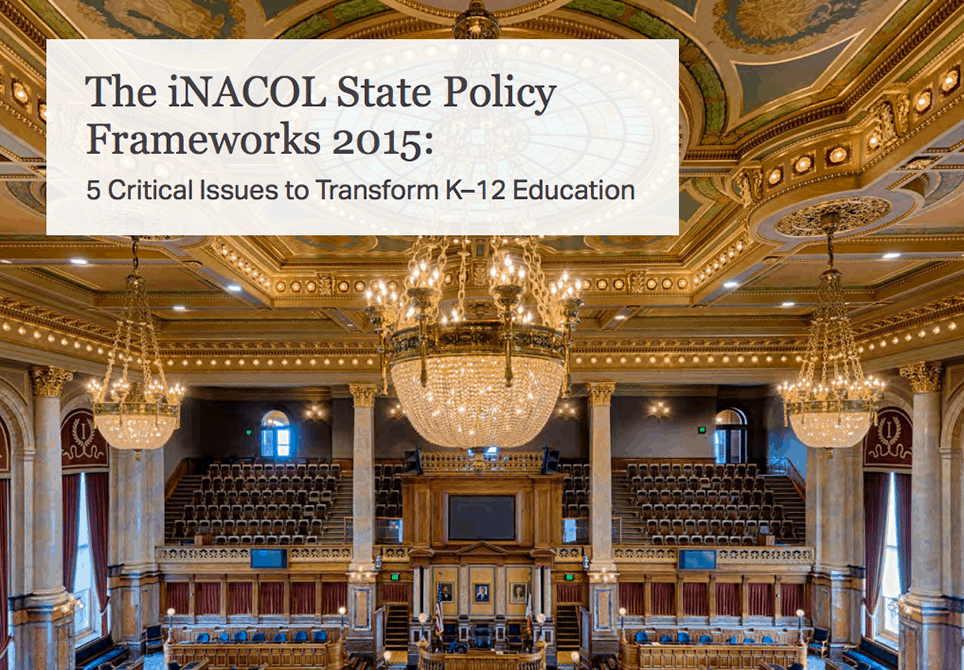Four Ways States Can Promote Quality in Blended and Online Learning

States have the opportunity to transform education as we know it. The 2015 iNACOL State Policy Frameworks presents frameworks for sustainable, systemic change that will dramatically increase personalized learning for students. In this blog that first ran on iNACOL.org, Dale Frost shares one of five frameworks that was released at the iNACOL Blended and Online Learning Symposium.
Dale Frost
With the growth of new learning models comes the need to improve quality assurance systems across K–12 to ensure that only high-quality, proven providers serve students. It is important to promote innovation while focusing on quality assurance by analyzing both the relationship between inputs of quality, such as reviewing courses and curricula for alignment with state standards, and the impact of programs on multiple outcome measures of student learning.
iNACOL has led the field in identifying quality standards for provider eligibility and appropriate outcomes-based performance metrics for transparency and accountability. One of the key challenges for the entire field of K–12 in any delivery mode–traditional, blended or online learning–is the lack of independent, valid assessments spanning the entire K–12 curriculum. Outside of new assessments aligned with state standards required for accountability, there are many untested subjects, grade levels and courses offered by online learning providers. Until appropriate independent, validated, third-party assessments are developed and adopted, true quality assurance will present a challenge.
States should demand that all providers report the data they use to evaluate program outcomes and student success. Given that blended and online learning modalities have unprecedented capabilities to collect data on teaching and learning, states should require transparent reporting on outcomes-based performance metrics.
States and authorizers should consider requiring each provider to have an approved quality assurance method to report on student learning outcomes. This includes asking for entry proficiency level benchmarking and student learning growth on statewide valid metrics, at a minimum.
Additionally, states and authorizers should require full-time online learning providers to report data on closing the achievement gap, success along learning progressions towards mastery of college and career ready competencies, and fidelity to student learning goals. States and authorizers requiring programs to transparently collect these metrics would assist the field in determining program quality based on multiple measures of data and in evaluating the inputs with relation to student learning outcomes.
State policy recommendations
- Require transparency and accountability for the quality of online learning providers, using outcomes-based student learning performance metrics for full-time and supplemental providers.
- Shut down schools and discontinue course providers that persistently fail to achieve positive outcomes for students.
- Adopt an objective quality review process to ensure that online programs and courses offered in the state adhere to state academic standards and iNACOL National Standards for Quality Online Courses, Online Teacher, and Online Programs.
- Create a student performance-based funding model with the primary purposes of motivating programs to provide world-class instruction and to maximize student gains—not to drive cost savings. Performance incentives should reward attainment of competencies and student growth along a learning trajectory, based on objective, externally validated learning metrics.
What recommendations would you provide state policymakers? Please comment or Tweet us, @nacol.
This is the third of five state policy frameworks to transform K-12 public education. Taken as a whole, they present a framework for sustainable, systemic change that will dramatically increase personalized learning opportunities for all students. The complete updated iNACOL State Policy Frameworks was released next week at the iNACOL Blended and Online Learning Symposium.
For more information, check out:
- Measuring Quality from Inputs to Outcomes: Creating Student Learning Performance Metrics and Quality Assurance for Online Schools
- iNACOL National Standards for Quality Online Courses, Online Teacher, and Online Programs
- iNACOL Quality Assurance Performance Metrics for Online Schools Adopted in the State of Iowa
- Performance-Based Funding & Online Learning: Maximizing Resources for Student Success
Dale Frost is the State Policy Director at iNACOL. Follow iNACOL on Twitter, @nacol.
Stay in-the-know with all things EdTech and innovations in learning by signing up to receive the weekly Smart Update. This post includes mentions of a Getting Smart partner. For a full list of partners, affiliate organizations and all other disclosures please see our Partner page.






0 Comments
Leave a Comment
Your email address will not be published. All fields are required.